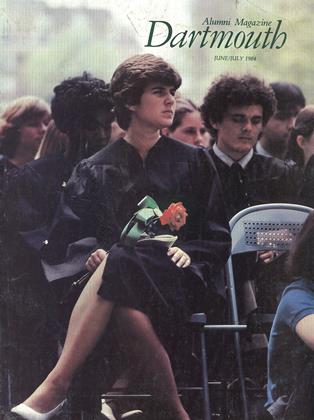Listen to the Music
It was half-way through sophomore year when Susan Smith (Portland, Ore.) decided she "really didn't want to be a doctor" and so, after attending a summer program in Aspen, Colorado, committed her life to her true love, playing the piano.
Even though she has been a successful pianist by anyone's standards she was one of 50 pianists from around the world invited to play next month in a competition in Michigan Smith still occasionally wonders about her career choice. "There are times when I get really scared: self-doubt times. I think, 'Gee, it would be really nice to have a job and make money and be secure.' But I don't think I would be really happy doing that. I know that if I couldn't play the piano I wouldn't be very happy."
When asked why she plays, Smith shrugs her shoulders and exclaims, "I just love it." She pauses and then continues, now a bit more philosophical, "I look at music as a problem to be solved conquering a certain type of music. It's not just playing. I like listening to it, too. Not only classical, I also like jazz. And, most of all, I love playing for someone."
Fifteen minutes later we are in one of the Hopkins Center's practice halls and Smith is sitting almost trance-like in front of the piano. Her fingers massage the key board coaxing every note from each key as. the music seems to flow through her body. If not for the faded jeans and beach thongs she could be in the middle of a recital.
Professor David Jones, Smith's senior thesis advisor, put it this way, "It's obvious from watching her perform that she enjoys very much what she is doing. She is speaking through her instrument in a way that is crucial for a pianist, or any musician, to be a complete performer."
Jeanne Fischer, a senior lecturer in music and Smith's teacher for four years, assesses her student, "There's a very good likelihood that she'll make a living as a musician. . . . She's very good in competitive situations. . . . Her temperament is really ideal for the kind of work she likes."
Even so, Smith reports that before a performance, "I am terrified. I'm really scared." Perhaps that explains why she practices four to six hours a day "playing a piece over and over until my fingers know where to go."
Jones observes, "She seems to have a tremendous" amount of self-discipline in her practice schedules. She practices too much, sometimes, to the point where she gets blisters."
Smith, whose laurels include the McDonald-Smith Prize and the Gerald Tracey Award, will attend the San Francisco Conservatory in Music next year to "study all different aspects of music and do a lot of playing." After that, Smith dreams, "I'd like to be good enough so I could play in different places around the world and people would enjoy it." She pauses and sounds a bit more practical, "A more realistic goal is to play in a confined community or area of the country and to perform; maybe get a teaching job at a school or university."
One look at the G clef Smith wears in a chain around her neck or a message from her piano-laden note cards and it's clear that she made the right decision two years ago.
"I look at music as aproblem to be solvedconquering a certain type of music.It's not just playing. Ilike listening to it,too. Not only classicall also like jazz.And most of all, Ilove playing forsomeone."
 View Full Issue
View Full Issue
More From This Issue
-
 Feature
FeatureProfessor John Stearns '16: Rara Avis Una
June | July 1984 By Eddie Chamberlain '36 -
 Feature
FeatureCreativity: The Open Dance at Dartmouth
June | July 1984 By Prof. Blanche Gelfant -
 Feature
FeatureWearers of the Green
June | July 1984 By Jim Kenyon -
 Feature
FeatureThe Best Part of My Academic Life Here
June | July 1984 -
 Feature
FeatureMaking it Happen
June | July 1984 By Peggy Sadler -
 Feature
FeatureThe Quiet Good Man
June | July 1984 By Young Dawkins '72
Brad M. Hutensky '84
-
 Feature
FeatureNine From '84
JUNE/JULY 1984 By Brad M. Hutensky '84 -
 Feature
FeatureCOOPERSTEIN
JUNE/JULY 1984 By Brad M. Hutensky '84 -
 Feature
FeaturePLATT
JUNE/JULY 1984 By Brad M. Hutensky '84 -
 Feature
FeatureBERNSTEIN
JUNE/JULY 1984 By Brad M. Hutensky '84 -
 Feature
FeatureGISH
JUNE/JULY 1984 By Brad M. Hutensky '84 -
 Feature
FeatureHARRIS
JUNE/JULY 1984 By Brad M. Hutensky '84
Features
-
 Feature
FeatureDartmouth in the Public Service
May 1962 -
 Feature
Feature2. Drinking
December 1987 -
 Cover Story
Cover StoryDaughters of Dartmouth
NOVEMBER 1988 By Anne Bagamery '78 -
 Feature
FeatureRUNNING ON IDEAS
OCTOBER 1991 By Charles Wheelan ’88 -
 Cover Story
Cover StoryThe Little Brook That Changed the World
JANUARY 1998 By David Dobbs -
 Feature
FeatureInterpreting Orozco's Epic
JANUARY/FEBRUARY 1984 By Jacquelynn Baas


